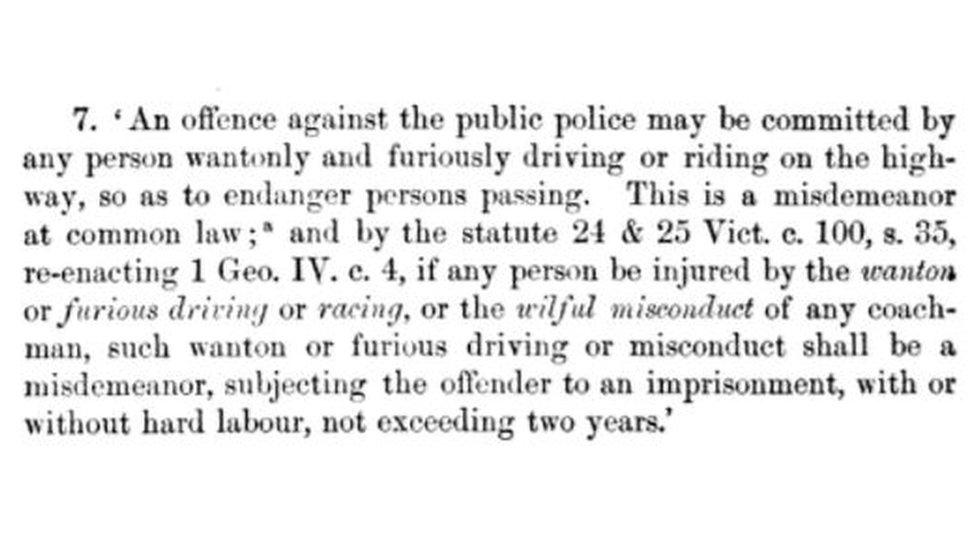Cyclist Charlie Alliston guilty over pedestrian's death
- Published

Kim Briggs died after being injured while crossing Old Street in Shoreditch in February
A cyclist who knocked over and killed a 44-year-old woman in east London last year has been cleared of her manslaughter.
But Charlie Alliston, 20, was found guilty of causing bodily harm by "wanton or furious driving".
Alliston was riding a fixed gear bike with no front brakes when he hit mum-of-two Kim Briggs as she was crossing the road in her lunch break.
She suffered serious head injuries and died a week later in hospital.
Alliston later went online to defend himself following the crash, claiming Mrs Briggs was at fault before deleting the comment when he realised how serious her injuries were.
He told the Old Bailey his comments had been stupid and not thought through.

Charlie Alliston went online to defend himself following the crash
Alliston was riding a fixie - a fixed-wheel bicycle with no front brake used by track racing cyclists - across a junction on Old Street, Shoreditch, last February when he said he saw HR consultant Mrs Briggs step out into the road while looking at her phone.
He told the court he shouted to warn her and slowed down to between 10 and 14 miles an hour.
Alliston said he shouted again and swerved to avoid her but Mrs Briggs stepped back into his path.
He claimed he was not aware a brake was a legal requirement to ride on the road and said even with one he wouldn't have been able to stop in time.
But crash investigators who studied CCTV of the incident concluded Alliston would have been able to stop and avoid the collision if the bike had been fitted with a front brake.

What is wanton and furious driving?

The law explained in the Commentaries on the Laws of England, published in 1867
Alliston was charged with an admittedly archaic offence - but it is the closest to dangerous driving a cyclist can be charged with.
Unlike a dangerous cycling charge, causing GBH by wanton and furious driving takes into account injury.
It may sound slightly eccentric, but perhaps it is down to its wording which was coined in 1861.
Introduced under the Offences Against the Person Act, the charge was created to deter people from driving horse carriages recklessly.
It is now used when it is not possible to prosecute under the Road Traffic Act 1988 - ie, when the vehicle in the crime was not mechanically propelled - and in cases of serious injury or death caused by a cyclist's actions.
It carries a maximum penalty of two years' imprisonment and/or an unlimited fine.
Previous successful prosecutions under the offence include those against cyclists Darryl Gittoes and Darren Hall, external, who both knocked down pedestrians who later died.


Alliston is due to be sentenced on 18 September and could be jailed for up to two years
Judge Wendy Joseph QC ordered a pre-sentence report, but made it clear she was considering a jail sentence for Alliston.
She said: "I have not seen one iota of remorse from Mr Alliston at all at any stage."
He is due to be sentenced on 18 September.
In a statement read in court, Matthew Briggs paid tribute to his "wonderful" wife, with whom he had a daughter aged 11 and a son aged 14.
He said: "She was quick to smile, slow to judge and even slower to anger."
'Illegal and stupid'
The case has raised questions about safety and responsibility on the road.
Mrs Briggs' family said they plan to campaign for tougher cycling laws to protect pedestrians.
Mr Briggs described the trial as "gruelling and painful".
He added: "Out of this senseless carnage, I shall try to bring change to the law and change to attitudes.
"Perhaps in this way I can honour my wife."
Duncan Dollimore, head of advocacy and campaigns at Cycling UK, said: "Riding a fixed wheel bicycle on busy roads without a front brake is illegal, stupid and endangers other road users especially pedestrians.
"Charlie Alliston's actions had tragic consequences for Kim Briggs' family and it was entirely right that this led to his prosecution."

What are the laws for riding 'fixies'?
Alliston's fixed-wheel track bike is the sort more commonly seen at an Olympic velodrome, being raced at great speeds.
In evidence, he told jurors he had no idea there were regulations that "fixies" have to have front brakes for use on the road.
The Pedal Cycle Construction and Use Regulations 1983 states a fixed wheel bicycle must have a front brake in addition to the rear fixed wheel before it can be lawfully ridden on a public road.
A fixed-wheel counts as a rear brake, however it needs a calliper on the front to legally ride it on a public road.

- Published17 August 2017

- Published14 August 2017
